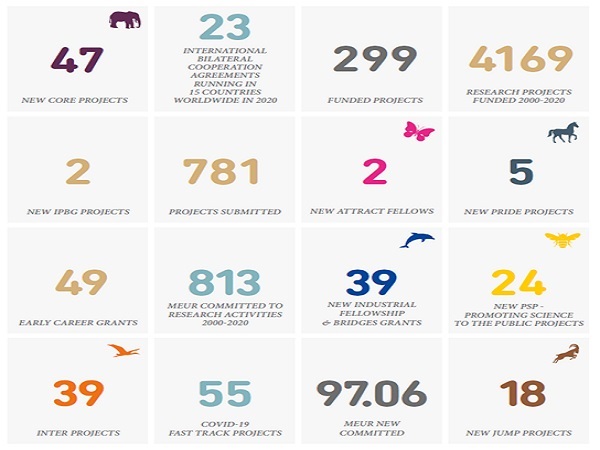 Main figures for 2020;
Credit: FNR
Main figures for 2020;
Credit: FNR
The Luxembourg National Research Fund (Fonds National de la Recherche - FNR) has published its annual report for 2020, a year which was marked by the COVID-19 crisis, but which also saw the funding of 299 research projects for a committed amount of €97.06 million.
In 2020, a total of 781 projects were submitted to the FNR, of which 299 received funding (up from 217 projects in 2019) for a committed amount of €97.06 million (up from €61.6 million in 2019). The increase in these two figures over one year can be explained on the one hand by the rapid implementation of calls for projects launched within the framework of the activities of the Research Luxembourg Task Force and on the other hand by the increase in the number of projects submitted in specific programmes (CORE, BRIDGES, Industrial Fellowships).
The COVID-19 pandemic was a defining moment for research in Luxembourg. All actors joined forces to use the combined expertise of Luxembourg science to tackle the crisis. The large-scale testing initiative, prevalence and stratification studies (CON-VINCE and Predi-COVID), epidemiological modelling and socio-economic impact assessment are just some of the activities carried out by the Research Luxembourg Task Force, which were partly co-financed by the FNR.
"The Luxembourg National Research Fund has largely contributed to these efforts", explained Marc Schiltz, Secretary General of the FNR, "both from a financial point of view, where €7.5 million have been mobilised, and through its very active involvement in the Research Luxembourg Task Force, where the FNR has coordinated several working groups". He continued: "The experience gained by the FNR over the years in dealing with journalists and policymakers has also been of great importance during this crisis. Over the past twelve months, science.lu has truly become a reference site for scientific communication around COVID-19. In addition, twelve detailed fact-checking articles were published in 2020".
At the administrative level, the FNR learned to adapt all its work processes to a new situation in a short period of time. Flexible measures were introduced as early as the end of March 2020 to help FNR-funded researchers cope with the difficult situation where many ongoing research projects had to be interrupted due to closures or travel restrictions.
However, 2020 was also the first year in which the FNR implemented the newly defined national research priorities in its funding instruments. In the main project funding programme, CORE, there was an impressive increase (almost 30%) in the number of applications submitted compared to previous years.
More specifically, the FNR committed to funding the following projects in 2020: 47 CORE projects (FNR’s main programme for funding high-quality research projects in the national research priorities); 55 COVID-19-related projects; 49 early career grants; 39 INTER projects (funding for projects in the framework of bi-, tri-, or multilateral international collaborations built on joint research activities); 24 PSP projects (funding aimed at fostering the exchange between science and society); eighteen JUMP projects (FNR’s facilitation programme for the commercialisation of research results); two FNR ATTRACT fellowships (grants for highly talented junior researchers).
Between 2000 and 2020, the FNR committed €813 million in funding to research activities; a total of 4,169 projects were funded during this period.
Marc Schiltz concluded: "Every crisis offers its share of opportunities. Learning from this particular period will help us at the FNR to further improve our work and to remain one of the key institutions in the research ecosystem. This ecosystem, which is evolving in an ever-changing environment, needs players who are able and willing to adapt. The FNR has proven to be such a player and will continue, as it has done over the past two decades, to ensure and promote quality research and build bridges to society".
The full 2020 annual report is available (in English) at www.fnr.lu/2020-annual-report.








